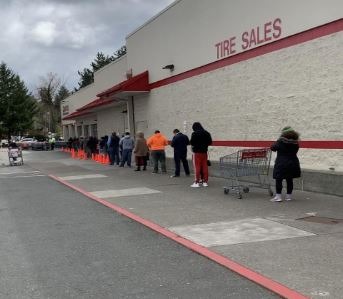Grocery stores implement policies to limit supply shortages and encourage social distancing
4 min read
Costco has also been limiting the amount of people that are in the store at once during their peak hours. This helps encourage social distancing as well as keeps the store less crowded. (Alexander Caldas | The Blue & Gray Press)
By ALEXANDER CALDAS
Staff Photographer
Two months ago, nobody would have believed you if you told them a pandemic was about to devastate the globe. COVID-19 has proven to be no joke, with over 2 million confirmed cases worldwide and a death count that has already surpassed 134,000 people. There have been more cases in the United States than anywhere else with over 600,000 confirmed cases and over 24,000 deaths.
From the start, there has been a shortage of supplies throughout our country. Those worst affected are in a dire need of ventilators to aid with the basic function of breathing. The health care workers and medical professionals who are taking care of the sick need protective equipment to avoid getting the virus themselves.
However, for those who have been able to avoid contracting this novel virus, the supply shortage has been evident in our local grocery stores, drug stores, and wholesalers. Stores have sold out of gloves, hand sanitizer, antibacterial hand soap and disinfectant wipes with no re-supply in sight. All of these products help us avoid contracting the disease and reduce the risk of spreading the virus.
Overall, this is a result of consumers buying in panic and stockpiling these items. These actions have resulted in stores having to limit the amount that a customer can purchase at a time as well as protecting the quantities of certain products that have a low inventory count. These restrictions squash a consumer’s ability to panic-buy and help distribute supplies of these items more evenly throughout our community.
Two week ago, the federal government changed their stance on the public wearing masks. Previously, they said the general public did not need to wear masks out in public to protect themselves from the virus. However, they are not recommending that people wear cloth face coverings in public places such as grocery stores and pharmacies.
This issue is one that citizens have been experiencing in many states that have issued stay-at-home orders that encourage everyone to stay home and only vacate their homes when absolutely necessary. Along with this order, social distancing has been implemented throughout the country, encouraging people to stay 6 feet away from other citizens in an effort to fight this disease.
Costco Wholesale has implemented some temporary changes to help protect their members. They are only allowing two people to enter the warehouse on each membership. They are limiting the number of customers that come in and out of the store at a time in an effort to assist with social distancing. Costco has also installed plexiglass barriers at each register to help protect their cashiers and have moved the credit card machines to the back of the counter, so customers swipe and take their own receipts with no physical contact between the customer and the cashier. All of these adjustments that stores have made are to protect both the Costco workers and the customers.
For those who are in more grave danger, such as those with auto-immune diseases as well as pre-existing health problems, simply going to the grocery store or pharmacy is a huge risk.
With so many people becoming unemployed because of the downturn in the economy and the shelter-in-place orders by most states, local food banks have become a necessity for many Americans. In addition to food banks, many citizens have stepped in to help the need of feeding families. For example, a local family in my area has been giving out free food in front of their house to anyone in need. This reduces the risk of having to go into a grocery store and possibly be exposed to the virus. All of these have been great changes for the community and the research has shown that these efforts are helping.









